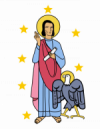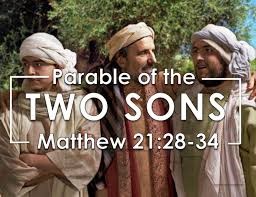Views from the Pews – Sunday, October 1, 2023
Brothers and Sisters:
I share with you Father Kevin O’Sullivan’s Commentary on the Gospel Reading for today.
This is the first of three parables which Matthew places in the same context because they have the same basic teaching. Christ is telling the leaders of the Jews that the fact that they were God’s Chosen People, and that they were proud of their observance of the law of Moses, is not a guarantee that they will possess the Kingdom of God. Rather, because of their pride and their refusal to obey God’s call to repentance, they will exclude themselves, while the tax-collectors and sinners, whom they despised, will repent of their sins and will be accepted into God’s Kingdom.
The leaders of the Jews prided themselves on their strict observance of the letter of the Mosaic law while they failed dismally to keeping its basic motive true : love of God and neighbour.
Our Lord now puts them a question in the form of a story or parable. It is a question, which if their pride could allow, would make them see the folly of their ways.
“I will not… go” : This son refused at first to work for his father, but later repented and went to work in the father’s vineyard. The second was prompt in promising obedience, but failed to carry out that promise.
Which…two : the temporary refusal of the first was blameworthy, but was forgiven because of the subsequent change of mind. The prompt “yes” of the second was valueless because of the failure to put it into execution.
The leaders gave the correct answer but refused to see any lesson for themselves in it. Christ brings out the lesson.
Of all sinners, the tax collectors and harlots were the most despised by the leaders of the Jews. Christ tells the leaders that these very sinners will be sharers in God’s Kingdom, while their own false pride will not let them share in it.
John the Baptist preached repentance to prepare his fellow Jews for the new Kingdom of God. The tax collectors and harlots listened to his advice and followed it. Most of them became followers of Christ. But the priests and elders did not listen to John (see Mat 3:7..) and (Jn 1:19), not even after they saw the conversion of the public sinners. They were, therefore, concerning themselves in condemning the second son. Like him, they pretended to be fully interested in their father’s business, but in practice they did their own will. Whereas the first son refused to do his father’s will, but later realized how wrong this was and set about obeying. He represented the public sinners and the Gentiles.
Think on these things!

